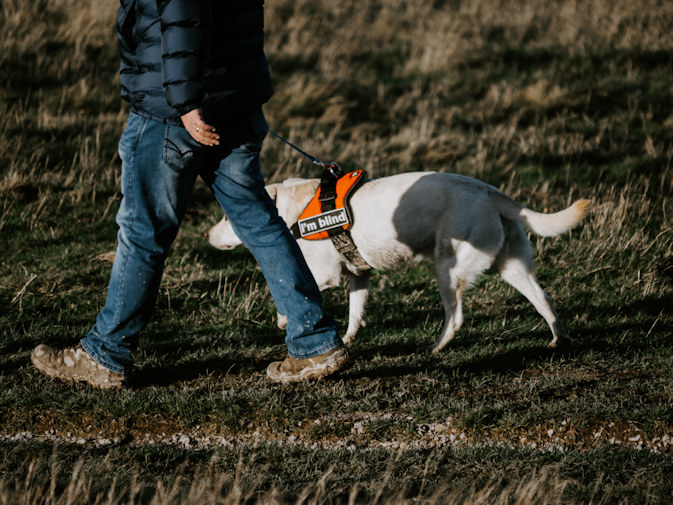Guidance for businesses on assistance dogs and the law
Published: 4 April 2023

Businesses must allow assistance dogs onto their premises, or risk breaking the law
The Council’s Access, Equality and Inclusion Hub is calling on all public places such as shops, pubs, hairdressers and restaurants to ensure that assistance dogs are let onto their premises, or risk breaking the law.
Thousands of disabled people rely on an assistance dog to help them with daily activities, such as going to the shops. Assistance dogs all undergo rigorous training meaning that they remain close to their owner and will not wander around freely. Most assistance dogs wear a harness or a jacket to make it clear that they are working dogs, however this is not a legal requirement.
Assistance dogs are not only available to support visually impaired people, but also Deaf people (hearing dogs) and those with other impairments such as epilepsy, diabetes, and mobility impairments. When an assistance dog is refused entry to a public place, their owner is prevented from accessing goods or services in a way that non-disabled people can, causing discrimination which is illegal under the Equality Act 2010.
Kirsten Roberts, a visually impaired person who uses a guide dog, contacted the Council’s Lead on Equality and Diversity after being told that she could not bring her guide dog into a shop as dogs were not allowed. Sadly, this wasn’t the first time Kirsten has experienced this and as a result, the Council’s Access, Equality and Inclusion Hub are reminding all businesses that they must not stop assistance dogs from entering their premises.
Kirsten said:
My guide dog allows me to get around. I can go shopping, go to work, and socialise with her by my side to guide me where I need to go. It’s important that places like shops allow all assistance dogs, such as guide dogs so that disabled people have the same access to shopping as non-disabled people. My dog is clean and extremely well trained and allowed in places where pet dogs are not. It can be frustrating and detrimental to my quality of life not to be allowed to enter somewhere because I have an assistance dog by my side. I want to go to shops, get a taxi, and eat in a restaurant without the fear of being challenged or refused, just like non-disabled people can.
Dale Durrant, a member of the Access, Equality and Diversity Hub said:
As soon as we heard about Kirsten’s experience at her local shop, we wanted to help her. I’m also a visually impaired person and when things happen like this it’s very distressing, especially when it goes against the Equality Act.
A Derby City Council spokesperson said:
It’s very disappointing to hear that disabled people in our city are continuing to experience disability discrimination because they have an assistance dog. We are asking all businesses to read the Equality and Human Rights Commission’s guidance about making sure that no disabled people who rely on assistance dogs are being discriminated against. Business owners must make sure that all their employees are also aware of the guidance.
For more information and advice, download the guide for businesses on assistance dogs and the law or visit the Equality and Human Rights Commission’s website.